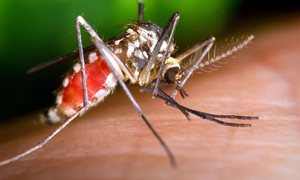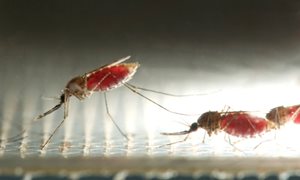7 January 2020
Plasmodium falciparum, the parasite that causes malaria, infects more than 200 million people, resulting in more than 400,000 deaths each year. Artemisinin is usually used in combination with other medicines to treat the disease. However, the growing resistance of the malaria parasite to the medicine is putting its effectiveness at risk. It was already known that mutations in the protein Kelch13 in the parasite coincide with artemisinin resistance, but it was still unclear exactly what role this mutated protein plays in this process. Together with colleagues from BNITM in Hamburg, Richard Bartfai’s team succeeded in revealing the molecular mechanism behind artemisinin resistance in malaria parasites. Malaria parasites cause the disease while living in red blood cells, where they feed on hemoglobin. The researchers have found that parasites with a mutation in the gene encoding the protein Kelch13 are less able to take up hemoglobin. As a result, the parasite produces fewer hemoglobin degradation products - and these degradation products are critical to activate artemisinin. Because the medicine is not sufficiently activated in parasites with the Kelch13-mutation, the medicine is no longer able to kill the parasite, causing resistance.
This discovery is a breakthrough in our understanding of artemisinin resistance, which might help developing novel strategies to counteract resistance in parasites with the help of other medicines.

Plasmodium falciparum, the parasite that causes malaria, infects more than 200 million people, resulting in more than 400,000 deaths each year. Artemisinin is usually used in combination with other medicines to treat the disease. However, the growing resistance of the malaria parasite to the medicine is putting its effectiveness at risk. It was already known that mutations in the protein Kelch13 in the parasite coincide with artemisinin resistance, but it was still unclear exactly what role this mutated protein plays in this process. Together with colleagues from BNITM in Hamburg, Richard Bartfai’s team succeeded in revealing the molecular mechanism behind artemisinin resistance in malaria parasites. Malaria parasites cause the disease while living in red blood cells, where they feed on hemoglobin. The researchers have found that parasites with a mutation in the gene encoding the protein Kelch13 are less able to take up hemoglobin. As a result, the parasite produces fewer hemoglobin degradation products - and these degradation products are critical to activate artemisinin. Because the medicine is not sufficiently activated in parasites with the Kelch13-mutation, the medicine is no longer able to kill the parasite, causing resistance.
This discovery is a breakthrough in our understanding of artemisinin resistance, which might help developing novel strategies to counteract resistance in parasites with the help of other medicines.
Related news items

Grants for research on magnesium deficiency and malaria Vidis for Felix Hol and Jeroen de Baaij
1 July 2022 Radboudumc researchers Jeroen de Baaij and Felix Hol both receive an NWO Vidi grant for their research, respectively on magnesium deficiency in type 2 diabetes and on malaria. go to page
Field research on malaria vaccine offers unexpected surprise
23 May 2022Field research on the effectiveness of a malaria vaccine, came up with unexpected results for an international group of researchers including Benjamin Mordmüller of Radboudumc. The vaccine evokes a broader response against malaria proteins than there are in the vaccine.
go to page
Rubicon grants awarded to three RIMLS researchers
19 April 2022Three researchers have received Rubicon funding from NWO/ZonMw. This will enable Elke Muntjewerff, Laura de Vries and Laurens van de Wiel to do research at a foreign research institute for the next two years.
go to page

